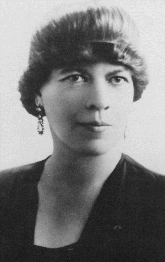

Darkness and Day by Ivy Compton Burnett. (1884-1969)
Reading Ivy Compton Burnett is not easy. This is the first of her books which I’ve actually succeeded in getting right through. But persistence paid off and, finally, I think I see the point of ICB. There is no other writer remotely like her, either in style or in content. The ‘story’, in so far as there is one, is conveyed almost entirely through dialogue, and you have to read very carefully to pick up the multifarious threads and cross-currents of conversation. Once you get rid of the idea that this is meant to represent ‘real life’ in any literal sense, you begin to appreciate the razor-like skill with which she conveys the ghastly entanglements of bourgeois family life, at the same time revealing its inherent humour and melodrama.
The New York Herald Tribune said: "Her specialty is a kind of surgical operation upon family life. Through her, we see it startlingly stripped of its more amiable pretensions. Parents and children, servants and masters, engage in a queer kind of verbal warfare bristling with innuendo and even with a candor that slashes to the quick. Her revelation of character ... [is] built upon a searching yet serene anlysis of the egotisms, envies, irascibilities that are part of domestic intercourse. By reason of her accurate avoidance of all pretense or idealism, her people actually become ... almost heroic, and vividly if bitterly funny."
Raymond Mortimer, reviewing Darkness and Day in the Sunday Times, wrote:
"Everyone in it [Darkness and Day] is either protecting himself from the truth or unearthing it. 'What we ought to be is not what we are.' If all the characters blaze with wit, this is in order to illuminate the most unlovely recesses of the human heart; in none of the fashionable prophets of despair do we find a blacker view of human nature. Yet here the reader is exhilarated — by the author's iron courage and by her austere diction, which can rise to poetic grandeur ..."
Opinion on Ivy Compton Burnett’s work has been divided, some claiming that she is a literary genius, others that she is unreadably pretentious.
"The most original novelist now writing in English", said V.S Pritchett, and Philip Toynbee commented: "Miss Compton-Burnett is totally unlike any other novelist. Wit and melodrama have never been so combined before, and the combination is a brilliant success.... She is a unique figure in modern English literature."
—
On the other hand, John o' London's Weekly, reviewing More Women Than Men described it as: "Pompous falsity ... a pinnacle of unreality", and reviewing Men and Wives, the New Statesman said:
"There is something rather cruel, rather horrible in Miss Burnett's talent."
There’s a wealth of information about ICB on the Internet – you could start with Wikipedia: http://en.wikipedia.org/wiki/Ivy_Compton-Burnett




